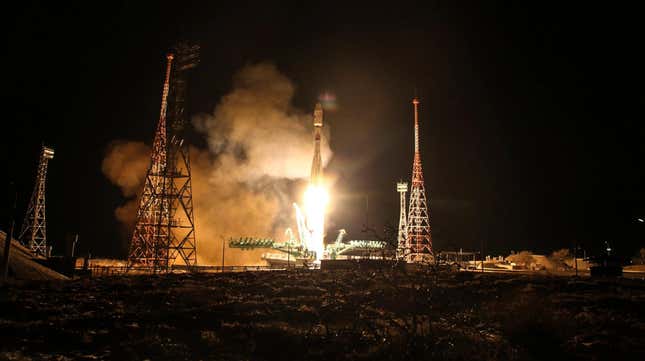
The Russian space agency may be willing to return 36 satellites it’s been keeping hostage in Kazakhstan in exchange for parts of its Soyuz rockets that are being held in French Guiana.
According to a report by Russian Space Web, French aerospace company Arianespace might be looking into a deal with Roscosmos to swap components of the Russian Soyuz rocket for 36 OneWeb satellites that have been held at its Kazakhstan launch site since March. Roscosmos’s newly appointed head Yuri Borisov is reportedly open to negotiations with Arianespace, a source told Russian Space Web.
Arianespace and OneWeb did not immediately respond to our request for confirmations of the Russian Space Web report. We’ll update this post should we hear back.
Under the helm of former Roscosmos head Dmitry Rogozin, the space agency severed ties with Europe in retaliation for Western-imposed sanctions against Russia. That included an ongoing deal it had with British company OneWeb to launch its internet satellites to orbit aboard the Soyuz rockets. OneWeb refused to agree to a list of unreasonable demands put forward by Roscosmos in March, prompting Russia to hold on to the company’s 36 satellites and store them indefinitely at its launch facility in Baikonur, Kazakhstan. OneWeb eventually forged new partnerships with SpaceX and India’s space agency to launch its remaining satellites to orbit, but its 36 lonesome satellites remained out of reach.
Roscosmos also halted its cooperation with Europe on Soyuz rocket launches from French Guiana and withdrew 87 employees from the launch site. But with Russian involvement in French Guiana terminated, the Soyuz rocket components were left abandoned, as Anatoly Zak writes at Russian Space Web:
On orders from Roskosmos head Dmitry Rogozin, dozens of Russian specialists were abruptly withdrawn from French Guiana in early March 2022, leaving behind the rocket stages, containers with propellant, support hardware and documentation. The Paris-based Arianespace company, which contracted Roskosmos to provide and support Soyuz launches with European and most non-Russian commercial payloads, took custody of the stored equipment until its expected return to Russia. However, due to the severe breakdown in diplomatic relations and economic activities between Europe and Moscow, the Russian hardware remained in French Guiana for the rest of 2022.
With Russia gone from French Guiana, the European Space Agency is turning to U.S. company SpaceX to launch its upcoming Euclid telescope to orbit instead of launching it on board a Soyuz rocket.
Following Rogozin’s dismissal from his position at Roscosmos, the space agency could be taking a more diplomatic approach to its space partnerships. But it could still take some time. Russian Space Web’s source said some logistical hurdles still need to be addressed, which are causing negotiations to advance at a slow pace. For example, Russian specialists would need to obtain new visas to enter French Guiana and retrieve the rocket parts, a process made more difficult on account of Russia’s severed ties with Europe.
The previous year was tumultuous for both the Russian and European space industry; Russia lost key space partners while Europe scrambled to find ways of reaching orbit without access to Soyuz rockets. Whether or not this will change this year remains to be seen, but an ongoing swap agreement may be a good step for now.
More: Europe Has Few Options to Reach Space After Vega-C Rocket Crash